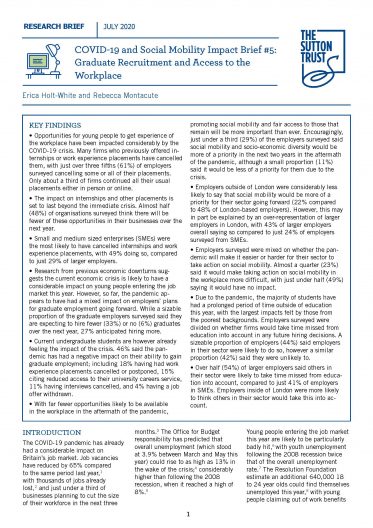For employers
1. Social mobility should not suffer because of the pandemic. With fewer jobs likely to be available, employers should redouble efforts to open up opportunities to the best talent. This should include paying and openly advertising internships, contextualising recruitment practices and monitoring the socio-economic background of the workforce. Employers can find detailed advice on actions they can take to improve social mobility in our Employer’s guide to social mobility in the workplace, released today.
2. Employers should work to keep the pipeline into their industry open, including where possible moving experiences online. Where internships, work experience placements or recruitment processes are moved online, employers should ensure they remain accessible, for example by providing tech equipment if needed. Interns and those doing placements should still be paid for their time, ideally at the Living Wage.
3. When moving recruitment online, employers can use it as a chance to widen the pool of young people reached. An opportunity has arisen with the shift to online recruitment, with employers able to reach large numbers of young people, without geographical restrictions. Businesses should make full use of the move to online delivery to reach a wider pool of talent.
4. In future, employers should take into account that many students have missed time in education due to the pandemic. Young people who have not been able to access online learning or impacted by missed exams should not be disadvantaged compared to those from other year groups. This will be particularly important for young people entering the world of work this year, but will continue to be an issue for years to come.
5. Where possible, employers should top up wages for young people on the government’s Kickstart scheme, from the National Minimum Wage to the Real Living Wage, to ensure all young people are able to access and benefit from these opportunities.
For government and universities
6. The government should put in place specific support for graduates, including incentivising employers to offer paid internships with graduate employers, to ensure that talent is harnessed. Youth unemployment will not be restricted to those with lower qualifications. Tailored support for graduates could form part of the government’s recently announced Kickstart scheme, with Kickstart Grads prioritising those the most at risk, for example graduates who have already had a period of unemployment, and those from families on low incomes who were eligible for the full maintenance loan when at university.
7. Government should ensure high quality careers advice, applicable to graduates and those entering professional careers, is available. This could be done through providing referrals to specialised recruitment agencies from job centres.
8. Financial support for postgraduate study should be increased for young people from lower socio-economic backgrounds. More graduates are likely to opt for postgraduate study this year while waiting for the economic situation to improve, but due to the low level of financial support available and fewer options for part time work, this option will be unaffordable to many. This is a particular concern for graduates from lower socio-economic backgrounds, who will be less able to draw on their families for financial support. The government should increase the master’s loan for the next academic year for graduates from poorer backgrounds, to match the amount available for undergraduate study.
9. University career guidance should be fully accessible online, prepare for the move to virtual recruitment, and have a particular focus on those from disadvantaged backgrounds. Students graduating this year will face a difficult job market, universities should do all they can to give them help and support, even when they are unable to come to campus. Support should also be updated to include help with remote recruitment, including video interviews.
